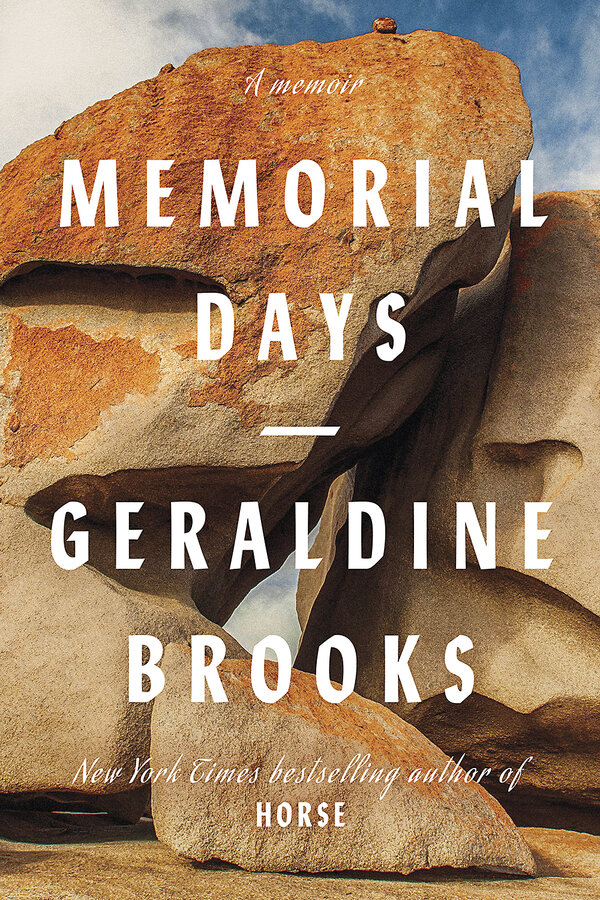A novelist embraces solitude and nature as antidotes to loss
Loading...
Pulitzer Prize-winning author Geraldine Brooks was halfway through writing her novel “Horse” in 2019 when she received devastating news. Her husband of more than 30 years, the celebrated author and Pulitzer Prize-winning journalist Tony Horwitz, had suddenly collapsed on a sidewalk in Washington and died.
Horwitz’s abrupt death plunged Brooks not just into confusion and profound grief, but also into the disorienting maelstrom of tasks that are demanded of those left behind. In the process, she lost the breathing room to embrace the full measure of mourning.
Brooks’ moving new memoir, “Memorial Days,” is a chronicle of fully acknowledging her loss and moving toward solace. In February 2023, almost four years after her husband’s death, she sets out for an isolated shack on Flinders Island off the coast of her native Australia to do “the unfinished work of grieving.”
Why We Wrote This
There is no single set of instructions on how to cope with grief. But a gifted writer, sharing her own story, can offer a path out of darkness toward reflection and peace.
Horwitz died on Memorial Day. With this sojourn, Brooks begins her own “memorial days,” finally giving herself the time for “a grief deep enough to reflect our love.”
The book’s chapters alternate between Brooks’ account of the days and weeks immediately following her husband’s death and her journey of reflection and healing on Flinders Island.
We learn about Brooks and Horwitz as individuals as well as about the fabric of their life together – meeting in journalism school, falling in love, finding a symbiotic relationship as writers, living around the world as foreign correspondents.
The couple finally set down roots on Martha’s Vineyard to become full-time authors and to raise two boys.
Brooks describes being at their home in West Tisbury, Massachusetts, when she got the call flatly informing her that her husband had died. Her first reaction is denial: “Not my husband out on the road energetically promoting his new book. My husband with the toned body of a six-day-a-week gym rat. The sixty-year-old who still wears clothes the same size as the day I met him in his twenties. My husband, younger than I am – hilarious, bursting with vitality. He’s way too busy living. He cannot possibly be dead.”
But quickly Brooks confronts the “brutal, broken system” of American health care.
She is passed along from EMTs to doctors to health insurance bureaucrats.
Later she is appalled to find that her family’s health coverage was canceled the day after Horwitz’s death because he was the primary policyholder.
Yet Brooks refuses to crumple under the weight of addressing others’ needs and expectations, making the necessary arrangements, managing the administrative details involved in the “obstacle course of legally ending a life.”
While she finds that distraction and busyness somehow center the mind on what can be controlled and what cannot, something is lost in the process. “I have vaulted right over denial, anger, bargaining, and depression and landed in the soft sands of acceptance,” thereby beginning an “endless, exhausting performance” of a woman coping, “a woman being normal.”
She wonders if she will ever do anything creative again.
But on Flinders, an island remnant from a time when Australia and Tasmania were connected, Brooks finds comfort in deep solitude. She finds reading the few of Horwitz’s journals she brought along a way to commune with him and remember, warts and all.
She also grieves losing the life she would have had with him had he lived – the plans they made, their vision for growing old together.
Brooks, who was born and raised in Australia, takes great delight in the wild beauty of the island.
The author of four nonfiction books and six novels, including the Pulitzer Prize-winning “March,” she vividly evokes a place she comes to consider almost sacred, with its massive, vertical cliffs and wide, white sand beaches surrounded by stunning flora and curious creatures. Her descriptions of her environment and her daily ventures into nature are some of the book’s most compelling passages.
However, Brooks’ journalistic expertise plays a part as well. In one fascinating chapter, she reflects on the variety of ways different cultures experience and express grief, the rituals and observances that allow people to sit with their sorrow.
A day at a time, Brooks starts to reclaim her true self. As she recalls the shiva for her husband, she remembers a reading the rabbi offered, quoting an excerpt of Mary Oliver’s poem “Sometimes.” It aptly reflects Brooks’ impetus to share her story:
Instructions for living a life:
Pay attention.
Be astonished.
Tell about it.







